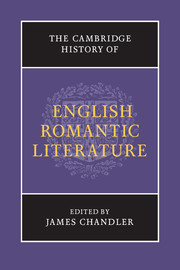Book contents
- Frontmatter
- Introduction
- Part I The Ends of Enlightenment
- Part II Geographies: The Scenes of Literary Life
- Part III Histories: Writing in the New Movements
- 15 Rebellion, revolution, reform: the transit of the intellectuals
- 16 Changes in the world of publishing
- 17 The new poetries
- 18 Romanticism and poetic autonomy
- 19 Transformations of the novel – I
- 20 Transformations of the novel – II
- 21 Theatre, performance and urban spectacle
- 22 The epigenesis of genre: new forms from old
- 23 The literature of the new sciences
- 24 The making of child readers
- Part IV The Ends of Romanticism
- Chronology
- Bibliographies
- Index
- 1 A New Pocket Map of the Cities of London and Westminster; with the Borough of Southwark, Comprehending the new Buildings and other Alterations, 3rd edn (London: William Faden, 1790).">
- References
16 - Changes in the world of publishing
from Part III - Histories: Writing in the New Movements
Published online by Cambridge University Press: 28 May 2009
- Frontmatter
- Introduction
- Part I The Ends of Enlightenment
- Part II Geographies: The Scenes of Literary Life
- Part III Histories: Writing in the New Movements
- 15 Rebellion, revolution, reform: the transit of the intellectuals
- 16 Changes in the world of publishing
- 17 The new poetries
- 18 Romanticism and poetic autonomy
- 19 Transformations of the novel – I
- 20 Transformations of the novel – II
- 21 Theatre, performance and urban spectacle
- 22 The epigenesis of genre: new forms from old
- 23 The literature of the new sciences
- 24 The making of child readers
- Part IV The Ends of Romanticism
- Chronology
- Bibliographies
- Index
- 1 A New Pocket Map of the Cities of London and Westminster; with the Borough of Southwark, Comprehending the new Buildings and other Alterations, 3rd edn (London: William Faden, 1790).">
- References
Summary
The term ‘publishing’, used to denote a discrete and stable commercial practice, dates from the first quarter of the nineteenth century. It was only at that time that people began to refer to such entities as ‘the world of publishing’ at all. Less abstractly, it was also at that time that publishers themselves appeared on the scene in something like their modern guise, soon becoming the dominant force in the commerce of the book. Both developments were of the utmost importance for the creation, distribution and reception of literary work. The earliest example of the general usage given by the Oxford English Dictionary is attributed to Sir Walter Scott – a provenance that is almost too appropriate. Whilst it is unlikely that Scott, or any other individual for that matter, really inaugurated the usage, he was famously the author who made the most of the transformation that was captured by this shift. Scott exemplified, and was taken at the time to exemplify, the possibilities raised by such conjunctions of literary and commercial innovation. Those conjunctions are the subject of this chapter.
The years of Romanticism saw the English book trade change from a craft to something that might plausibly be called an industry. The trade expanded enormously, adopted new business techniques, embraced specialization, addressed a far larger and more diverse readership, and, toward the end of the period, embraced major technological change. It created new modes of public dialogue, including new literary forms.
Keywords
- Type
- Chapter
- Information
- The Cambridge History of English Romantic Literature , pp. 377 - 402Publisher: Cambridge University PressPrint publication year: 2009
References
- 1
- Cited by

